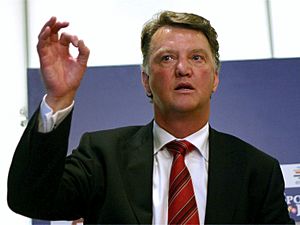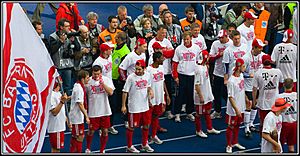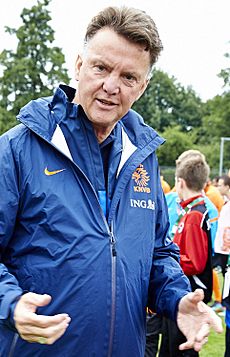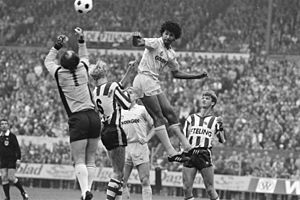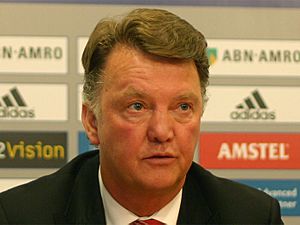Louis van Gaal facts for kids
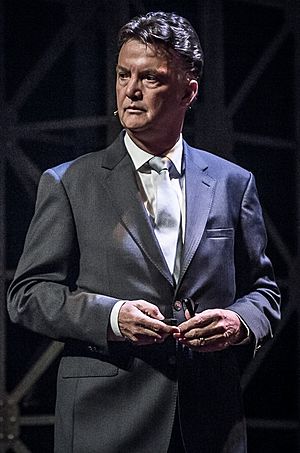
Van Gaal in 2014
|
||||||||||||||||
| Personal information | ||||||||||||||||
|---|---|---|---|---|---|---|---|---|---|---|---|---|---|---|---|---|
| Full name | Aloysius Paulus Maria van Gaal | |||||||||||||||
| Date of birth | 8 August 1951 | |||||||||||||||
| Place of birth | Amsterdam, Netherlands | |||||||||||||||
| Height | 1.85 m (6 ft 1 in) | |||||||||||||||
| Position(s) | Midfielder | |||||||||||||||
| Team information | ||||||||||||||||
|
Current team
|
Ajax (advisor) | |||||||||||||||
| Youth career | ||||||||||||||||
| RKSV de Meer | ||||||||||||||||
| Senior career* | ||||||||||||||||
| Years | Team | Apps | (Gls) | |||||||||||||
| RKSV de Meer | ||||||||||||||||
| 1972–1973 | Ajax | 0 | (0) | |||||||||||||
| 1973–1977 | Royal Antwerp | 41 | (7) | |||||||||||||
| 1977–1978 | Telstar | 25 | (1) | |||||||||||||
| 1978–1986 | Sparta Rotterdam | 248 | (26) | |||||||||||||
| 1986–1987 | AZ | 17 | (0) | |||||||||||||
| Total | 331 | (34) | ||||||||||||||
| Managerial career | ||||||||||||||||
| 1991–1997 | Ajax | |||||||||||||||
| 1997–2000 | Barcelona | |||||||||||||||
| 2000–2001 | Netherlands | |||||||||||||||
| 2001 | Netherlands U20 | |||||||||||||||
| 2002–2003 | Barcelona | |||||||||||||||
| 2005–2009 | AZ | |||||||||||||||
| 2009–2011 | Bayern Munich | |||||||||||||||
| 2012–2014 | Netherlands | |||||||||||||||
| 2014–2016 | Manchester United | |||||||||||||||
| 2021–2022 | Netherlands | |||||||||||||||
|
Medal record
|
||||||||||||||||
| *Club domestic league appearances and goals | ||||||||||||||||
Aloysius Paulus Maria "Louis" van Gaal (born 8 August 1951) is a famous Dutch former football player and manager. He is currently an advisor for Ajax. Van Gaal managed many top clubs like Ajax, Barcelona, AZ, Bayern Munich, and Manchester United. He also led the Netherlands national team three different times.
Before becoming a coach, Van Gaal played as a midfielder for several teams. He was also a qualified physical education teacher. After being an assistant coach, he became the head coach of Ajax in 1991. With Ajax, he won three league titles, the UEFA Cup, and the UEFA Champions League. He then moved to Barcelona in 1997, winning two league titles and one Copa del Rey.
Van Gaal later coached the Netherlands, but they did not qualify for the 2002 FIFA World Cup. He returned to Barcelona briefly, then went to AZ, where he won another league title. In 2009, he joined Bayern Munich and won the Bundesliga and the DFB-Pokal. He also reached the UEFA Champions League final. He coached the Netherlands again, leading them to third place at the 2014 FIFA World Cup. After that, he managed Manchester United and won the FA Cup in 2016. He announced his retirement in 2019 but returned to manage the Netherlands for a third time in 2021. He retired from managing after the 2022 FIFA World Cup.
Contents
- Playing Career and Early Coaching Steps
- Management Career Highlights
- Leading Ajax to Success (1991–1997)
- Time at Barcelona (1997–2000)
- Coaching the Netherlands (2000–2002)
- Second Spell at Barcelona (2002–2003)
- Return to Ajax (2004)
- Success with AZ (2005–2009)
- Leading Bayern Munich (2009–2011)
- Third Time with the Netherlands (2012–2014)
- Managing Manchester United (2014–2016)
- Break from Managing (2016–2021)
- Fourth Time with the Netherlands (2021–2022)
- Management Style
- Personal Life
- Career Statistics
- Managerial Statistics
- Honours and Awards
- See also
Playing Career and Early Coaching Steps
Van Gaal was born in Amsterdam, Netherlands. He started playing football for an amateur team called RKSV de Meer. When he was 20, he joined the second team of Ajax. However, he never played for the first team, which had famous players like Johan Cruyff at the time.
He was loaned to a Belgian team, Royal Antwerp, where he was a runner-up in the Belgian league twice. After four years in Belgium, he returned to the Netherlands. He played for Telstar and then Sparta Rotterdam. In 1986, he joined AZ and also became an assistant coach there. After a short time at AZ, he went back to Ajax as an assistant to Leo Beenhakker. When Beenhakker left in 1991, Van Gaal became the main manager.
Management Career Highlights
Leading Ajax to Success (1991–1997)
Van Gaal was the manager of Ajax from 1991 to 1997. He had a very successful time there. Under his leadership, Ajax won the Eredivisie (Dutch league) three times: in 1994, 1995, and 1996. In the 1994–95 season, his team was amazing, going unbeaten in both the league and the UEFA Champions League.
He also led Ajax to win the KNVB Cup in 1993 and the Johan Cruyff Shield three times (1993, 1994, 1995). In European competitions, Ajax won the UEFA Cup in 1992. They also won the UEFA Champions League in 1995 by beating Milan in the final. After that, they won the UEFA Super Cup and the Intercontinental Cup. Ajax also reached the Champions League final in 1996 but lost on penalties.
Many Ajax players from Van Gaal's time, like Patrick Kluivert, Marc Overmars, and Edwin van der Sar, became key players for the Netherlands national team. After his contract with Ajax ended in 1997, Van Gaal received a special honor called a knighthood.
Time at Barcelona (1997–2000)
Van Gaal moved to Barcelona in 1997. He helped the team win two La Liga titles (1998, 1999) and the Copa del Rey once. Despite this success, he sometimes had disagreements with the media and faced criticism. He felt it was hard to make his football ideas work at Barcelona because of cultural differences. He also had arguments with some players, like Rivaldo, who did not always want to play where Van Gaal wanted him to.
Van Gaal left Barcelona in May 2000. He then returned to the Netherlands to manage the national team.
Coaching the Netherlands (2000–2002)
Van Gaal's time as the Netherlands coach started poorly. His team struggled to qualify for the 2002 FIFA World Cup. They drew with the Republic of Ireland and lost to Portugal.
In 2001, despite some wins, the Netherlands drew with Portugal after leading 2–0. This meant they fell behind Ireland in their group. When they played Ireland in Dublin, the Netherlands lost 1–0. This result meant they failed to qualify for the World Cup for the first time since 1986. Van Gaal stepped down as manager in January 2002.
Second Spell at Barcelona (2002–2003)
Van Gaal returned to Barcelona for the 2002–03 season. The team did well in the UEFA Champions League, winning ten matches in a row. However, they struggled in La Liga. After a series of mixed results and three straight losses, Van Gaal left Barcelona in January 2003. The club was in 12th place at the time.
Some of the players he signed, like Juan Román Riquelme, did not perform as expected. Van Gaal had also let go of Rivaldo, a star player, which caused some controversy.
Return to Ajax (2004)
In 2004, Van Gaal briefly returned to Ajax as a technical director. However, he resigned later that year due to disagreements within the club.
Success with AZ (2005–2009)
In January 2005, Van Gaal became the manager of AZ. Under his guidance, AZ finished second in the Eredivisie in 2006 and third in 2007. He also led AZ to the final of the 2006–07 KNVB Cup.
Van Gaal initially planned to leave AZ at the end of the 2007–08 season because of disappointing results. However, his players asked him to stay, and he agreed to give them another chance.
The 2008–09 season started with two losses for AZ. But after that, the team went on an amazing unbeaten run until April. They topped the league table for the entire season, even though many experts thought they would finish much lower. AZ won the league title on 19 April 2009, their second league title ever.
Leading Bayern Munich (2009–2011)
On 1 July 2009, Van Gaal became the coach of Bayern Munich. He called it a "dream club." He signed Dutch player Arjen Robben from Real Madrid, bringing them back together.
Van Gaal's start at Bayern was not easy, but he believed his team needed time to play his way. He brought in young players like Thomas Müller and Holger Badstuber into the main team. He also changed Bastian Schweinsteiger from a winger to a defensive midfielder.
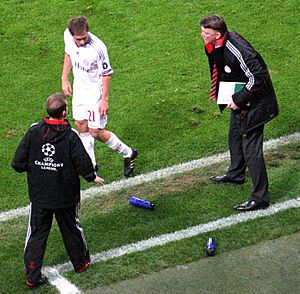
Bayern's performance improved. They won important UEFA Champions League matches, including a big 4–1 victory over Juventus. By March, Bayern was at the top of the Bundesliga and in the semi-finals of the DFB-Pokal.
On 8 May 2010, Bayern won the Bundesliga title, making Van Gaal the first Dutch coach to win it. On 15 May 2010, Bayern also won the DFB-Pokal, completing a domestic "double" (winning both the league and cup).
In the Champions League, Bayern reached the final but lost 2–0 to Internazionale. Van Gaal was voted "Manager of the Year" in Germany for his achievements. Bayern also won the 2010 DFL-Supercup at the start of the 2010–11 season. However, Van Gaal was sacked by Bayern in April 2011 after the team's performance dropped.
Third Time with the Netherlands (2012–2014)
On 6 July 2012, Van Gaal was announced as the new coach of the Netherlands national team. He was assisted by former Dutch players Danny Blind and Patrick Kluivert.
Van Gaal led the Netherlands through their 2014 FIFA World Cup qualification very successfully. They won nine out of ten matches and qualified easily.
At the World Cup, the Netherlands surprised many by beating defending champions Spain 5–1 in their first game. Van Gaal used a special 3–5–2 formation, which helped his team use counter-attacks effectively. They also beat Australia and Chile to win their group.
In the knockout stages, they defeated Mexico 2–1. In the quarter-final against Costa Rica, Van Gaal made a bold move. In the last minute of extra time, he substituted his main goalkeeper Jasper Cillessen for Tim Krul just for the penalty shootout. Krul saved two penalties, sending the Netherlands to the semi-finals. They lost to Argentina in another penalty shootout. Van Gaal's time as manager ended on 12 July 2014, when the Netherlands beat Brazil 3–0 to finish third in the World Cup.
Managing Manchester United (2014–2016)
Van Gaal became the new manager for Manchester United on 19 May 2014. He was the first manager from outside the British Isles for the club. He signed a three-year contract after the 2014 World Cup. He brought in Ryan Giggs as his assistant.
2014–15 Season at United
Van Gaal made several new signings, including Ander Herrera, Luke Shaw, Marcos Rojo, Ángel Di María, and Daley Blind. He also brought in Radamel Falcao on loan.
His first competitive game was a 2–1 home defeat to Swansea City. Manchester United also lost 4–0 to a lower-league team, Milton Keynes Dons, in the League Cup. This was United's earliest exit from that competition. His first league win came against Queens Park Rangers, a 4–0 victory.
After ten league matches, United were in ninth place, their worst start since 1986. Van Gaal said it would take three years to get his team to its full potential. The team's form improved later in the season. They had a run of seven straight Premier League wins. United finished the season in fourth place, which was an improvement from the previous season.
2015–16 Season at United
In the summer of 2015, Van Gaal signed more players, including Memphis Depay, Matteo Darmian, Morgan Schneiderlin, Bastian Schweinsteiger, and Anthony Martial.
United qualified for the 2015–16 UEFA Champions League group stage. Domestically, they were strong in defense and reached the top of the Premier League in September. However, they were knocked out of the League Cup by Middlesbrough. They also exited the Champions League at the group stage after a loss to VfL Wolfsburg. They then played in the 2015–16 UEFA Europa League.
On 21 May 2016, Van Gaal won his only trophy with Manchester United, the FA Cup. His team beat Crystal Palace 2–1 in extra time. However, just two days later, Van Gaal and his Dutch staff were sacked by the club.
Break from Managing (2016–2021)
On 17 January 2017, Van Gaal announced he was taking a break from football for family reasons. He later said it was just a sabbatical. He officially retired from football on 12 March 2019.
Fourth Time with the Netherlands (2021–2022)
On 4 August 2021, Van Gaal came out of retirement to manage the Netherlands national team for a fourth time. He took over after the team's disappointing performance at UEFA Euro 2020.
His first match in this new role was a 1–1 draw against Norway in September 2021. In the 2022 FIFA World Cup, the Netherlands finished first in their group. They then defeated the United States 3–1 in the round of 16. On 9 December, Van Gaal's team lost to Argentina on penalties in the quarter-finals. After this, Van Gaal resigned as head coach of the Netherlands. He had managed 20 matches in his last period without a single defeat.
Management Style
Van Gaal is seen as one of the most successful football managers ever. He has inspired many other coaches, including José Mourinho and Pep Guardiola, who were once his assistants or players. Because of his strict and strong personality, he was sometimes called the "Iron Tulip." However, Van Gaal did not like this nickname, as he believed he was always fair.
Even though he sometimes had disagreements with players and the media, he was known for his leadership. He saw himself as a "relationship" manager, focusing on the mental side of the game. He was also very good at helping young players develop and teaching them his football ideas, especially during his time at Ajax in the 1990s.
In an interview in 2008, Van Gaal said his football philosophy was more important than the specific systems he used. He believed coaches needed to be flexible. He used different formations throughout his career, like 4–3–3 and 3–5–2. He also thought it was very important to plan games well tactically and for his players to be disciplined and work hard in training.
At Ajax, Van Gaal's style was inspired by Dutch "Total Football." His players were known for quick passing and being able to play in different positions. He brought in experts from other sports to improve his players' fitness. He also used his goalkeeper, Edwin van der Sar, as a "sweeper keeper." This meant Van der Sar would not only save shots but also help start attacks with his passing. Van Gaal's teams were known for their skill, tactics, and physical strength. Defensively, they played with a high line and pressed opponents when they did not have the ball.
Van Gaal believed in playing exciting, attacking football based on keeping possession. However, he also believed that winning was the most important thing. At AZ, he sometimes used a more counter-attacking style to win the league. He also changed his style for the Netherlands at the 2014 World Cup, using a more defensive, counter-attacking 5–3–2 formation. This worked well against Spain's possession-based style. He used a similar approach at the 2022 World Cup. During his time at Manchester United, some people criticized him for using "long ball" tactics, but Van Gaal denied this.
Despite his achievements, Johan Cruyff often criticized Van Gaal's coaching style. Cruyff felt Van Gaal was too rigid, while Cruyff preferred players to think for themselves on the field.
Personal Life
Louis van Gaal is the youngest of nine children. His father passed away when Louis was 11 years old. At 18, he met Fernanda Obbes, and they married three years later. They had two daughters, Brenda and Renate. In 1994, Fernanda passed away from cancer. In 2008, Van Gaal married his current wife, Truus.
In April 2022, Van Gaal shared that he was receiving treatment for prostate cancer. He later announced in April 2022 that his treatment was successful.
Career Statistics
Club Playing Record
| Club | Season | League | Cup | Europe | Total | ||||
|---|---|---|---|---|---|---|---|---|---|
| Apps | Goals | Apps | Goals | Apps | Goals | Apps | Goals | ||
| Ajax | 1971–72 | 0 | 0 | 0 | 0 | 0 | 0 | 0 | 0 |
| 1972–73 | 0 | 0 | 0 | 0 | 0 | 0 | 0 | 0 | |
| Total | 0 | 0 | 0 | 0 | 0 | 0 | 0 | 0 | |
| Royal Antwerp | 1973–74 | 9 | 2 | 3 | 0 | — | 12 | 2 | |
| 1974–75 | 3 | 0 | 6 | 2 | — | 9 | 2 | ||
| 1975–76 | 19 | 4 | 2 | 2 | 4 | 0 | 25 | 6 | |
| 1976–77 | 10 | 1 | 1 | 0 | — | 11 | 1 | ||
| Total | 41 | 7 | 12 | 4 | 4 | 0 | 57 | 11 | |
| Telstar | 1977–78 | 25 | 1 | — | — | 25 | 1 | ||
| Sparta Rotterdam | 1978–79 | 31 | 5 | — | — | 31 | 5 | ||
| 1979–80 | 33 | 1 | — | — | 33 | 1 | |||
| 1980–81 | 33 | 5 | — | — | 33 | 5 | |||
| 1981–82 | 24 | 1 | — | — | 24 | 1 | |||
| 1982–83 | 33 | 5 | — | — | 33 | 5 | |||
| 1983–84 | 34 | 2 | — | 6 | 0 | 40 | 2 | ||
| 1984–85 | 30 | 4 | 3 | 0 | — | 33 | 4 | ||
| 1985–86 | 31 | 3 | — | 4 | 0 | 35 | 3 | ||
| Total | 248 | 26 | 3 | 0 | 10 | 0 | 261 | 26 | |
| AZ | 1986–87 | 17 | 0 | — | — | 17 | 0 | ||
| Career totals | 331 | 34 | 15 | 4 | 14 | 0 | 360 | 38 | |
Managerial Statistics
| Team | From | To | Record | |||||
|---|---|---|---|---|---|---|---|---|
| G | W | D | L | Win % | Ref. | |||
| Ajax | 28 September 1991 | 30 June 1997 | 285 | 196 | 49 | 40 | 68.77 | |
| Barcelona | 1 July 1997 | 20 May 2000 | 171 | 95 | 32 | 44 | 55.56 | |
| Netherlands | 7 July 2000 | 30 November 2001 | 14 | 8 | 4 | 2 | 57.14 | |
| Barcelona | 1 July 2002 | 28 January 2003 | 30 | 16 | 5 | 9 | 53.33 | |
| AZ | 1 July 2005 | 30 June 2009 | 182 | 105 | 39 | 38 | 57.69 | |
| Bayern Munich | 1 July 2009 | 10 April 2011 | 96 | 59 | 18 | 19 | 61.46 | |
| Netherlands | 6 July 2012 | 12 July 2014 | 29 | 19 | 8 | 2 | 65.52 | |
| Manchester United | 16 July 2014 | 23 May 2016 | 103 | 54 | 25 | 24 | 52.43 | |
| Netherlands | 4 August 2021 | 9 December 2022 | 20 | 14 | 6 | 0 | 70.00 | |
| Total | 930 | 566 | 186 | 178 | 60.86 | |||
Honours and Awards
As a Manager
Ajax
- Eredivisie (Dutch League): 1993–94, 1994–95, 1995–96
- KNVB Cup: 1992–93
- Johan Cruyff Shield: 1993, 1994, 1995
- UEFA Champions League: 1994–95; Runner-up: 1995–96
- UEFA Cup: 1991–92
- UEFA Super Cup: 1995
- Intercontinental Cup: 1995
Barcelona
- La Liga (Spanish League): 1997–98, 1998–99
- Copa del Rey: 1997–98
- UEFA Super Cup: 1997
AZ
- Eredivisie (Dutch League): 2008–09
Bayern Munich
- Bundesliga (German League): 2009–10
- DFB-Pokal (German Cup): 2009–10
- DFL-Supercup: 2010
- UEFA Champions League Runner-up: 2009–10
Manchester United
- FA Cup: 2015–16
Netherlands National Team
- FIFA World Cup third place: 2014
Individual Awards
- World Soccer Manager of the Year: 1995
- Onze d'Or Coach of the Year: 1995
- El País Manager of the Year: 1995
- Rinus Michels Award: 2007, 2009
- Dutch Sports Coach of the Year: 2009, 2014
- Football Manager of the Year (Germany): 2010
- VDV Bundesliga Coach of the Season: 2009–10
- Anton Geesink Award: 2015
- Dutch Lifetime Achievement Award: 2017
- France Football 18th Greatest Manager of All Time: 2019
- Eredivisie Oeuvre Award: 2023
Special Honors
- Knight of the Order of Orange-Nassau: 1997
See also
 In Spanish: Louis van Gaal para niños
In Spanish: Louis van Gaal para niños
- List of European Cup and UEFA Champions League winning managers
- List of UEFA Cup winning managers
 | Aaron Henry |
 | T. R. M. Howard |
 | Jesse Jackson |



